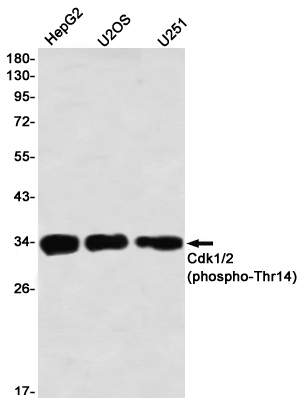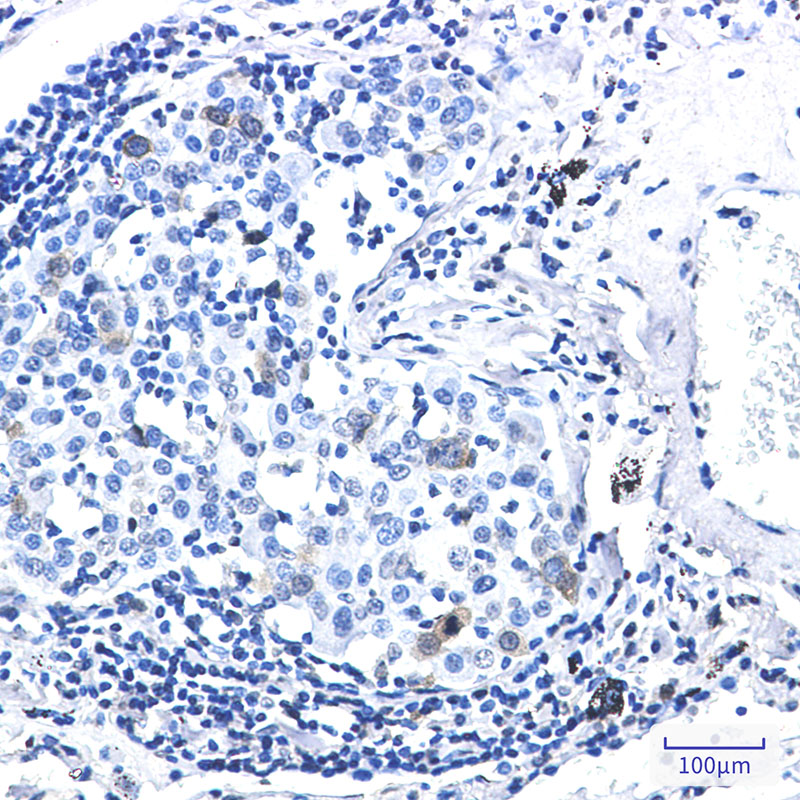

| WB | 咨询技术 | Human,Mouse,Rat |
| IF | 1/20 | Human,Mouse,Rat |
| IHC | 1/50-1/100 | Human,Mouse,Rat |
| ICC | 技术咨询 | Human,Mouse,Rat |
| FCM | 咨询技术 | Human,Mouse,Rat |
| Elisa | 咨询技术 | Human,Mouse,Rat |
| Aliases | CDKN2; p33(CDK2) |
| Entrez GeneID | 983/1017 |
| WB Predicted band size | Calculated MW: 34 kDa; Observed MW: 34 kDa |
| Host/Isotype | Rabbit IgG |
| Antibody Type | Primary antibody |
| Storage | Store at 4°C short term. Aliquot and store at -20°C long term. Avoid freeze/thaw cycles. |
| Species Reactivity | Human |
| Immunogen | A synthetic phosphopeptide corresponding to residues surrounding Thr14 of human Cdk1/2 |
| Formulation | Purified antibody in TBS with 0.05% sodium azide,0.05%BSA and 50% glycerol. |
+ +
以下是关于Phospho-CDK1/2 (Thr14)抗体的参考文献示例(注意:以下内容为示例,实际文献可能存在差异):
1. **"Cyclin-dependent kinase 1 (CDK1) phosphorylation at Thr14 regulates mitotic progression"**
- **作者**: Parker, L.L. et al.
- **摘要**: 该研究利用Phospho-CDK1 (Thr14)特异性抗体,发现Thr14位点的磷酸化由WEE1激酶介导,抑制CDK1活性以延迟有丝分裂进入,揭示其在细胞周期检查点中的调控作用。
2. **"Phosphorylation of CDK2 and CDK1 at Thr14/Tyr15 in response to DNA damage"**
- **作者**: Jin, P. et al.
- **摘要**: 通过Phospho-CDK1/2 (Thr14)抗体检测,作者证明DNA损伤信号通过激活CHK1激酶增强CDK1/2的抑制性磷酸化,从而阻滞细胞周期以修复损伤。
3. **"Targeting inhibitory phosphorylation of CDKs for cancer therapy"**
- **作者**: Malumbres, M. et al.
- **摘要**: 该综述总结了Thr14等位点的磷酸化在癌症中的异常调控,并讨论了利用特异性抗体检测CDK1/2磷酸化状态在药物开发中的潜在应用。
4. **"A monoclonal antibody specific for CDK1 phosphorylated at Thr14 and its application in studying oocyte maturation"**
- **作者**: Zhang, Y. et al.
- **摘要**: 研究开发了一种高特异性Phospho-CDK1 (Thr14)单克隆抗体,并通过其在非洲爪蟾卵母细胞模型中的实验验证了Thr14磷酸化对减数分裂恢复的抑制作用。
建议通过PubMed或Google Scholar以关键词“Phospho-CDK1 Thr14 antibody”或“CDK1 inhibitory phosphorylation”检索最新文献获取详细信息。
Phospho-CDK1/2 (Thr14) antibodies are essential tools for studying the regulation of cyclin-dependent kinases 1 and 2 (CDK1 and CDK2), which are critical regulators of cell cycle progression. CDK1. primarily involved in the G2/M transition, and CDK2. which governs the G1/S and S phase transitions, are tightly controlled by post-translational modifications, including inhibitory phosphorylation at specific residues. Phosphorylation at Thr14. located in the ATP-binding pocket of these kinases, is a key regulatory mechanism that suppresses their enzymatic activity. This modification is mediated by kinases such as WEE1 and MYT1 in response to DNA damage or incomplete replication, ensuring cell cycle arrest to allow repair or prevent genomic instability.
Antibodies targeting phosphorylated Thr14 in CDK1/2 enable researchers to detect and quantify this inhibitory modification in various experimental settings, including Western blotting, immunofluorescence, and immunoprecipitation. These antibodies are widely used to investigate cell cycle checkpoints, DNA damage response pathways, and the effects of therapeutic agents targeting CDK activity. Specificity validation, including knockout controls and peptide competition assays, is crucial to confirm their reliability. Such studies have highlighted the role of Thr14 phosphorylation in diseases like cancer, where dysregulated CDK activity contributes to uncontrolled proliferation. By monitoring Thr14 phosphorylation status, researchers gain insights into cellular stress responses and the efficacy of CDK-targeted therapies.
×